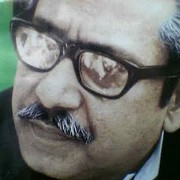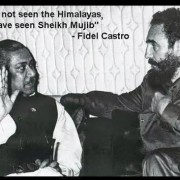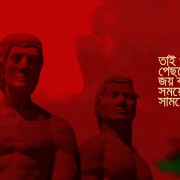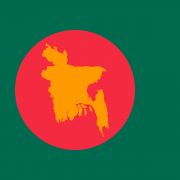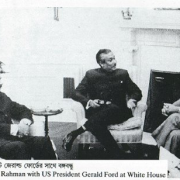Biography : Sheikh Mujibur Rahman
Some of the biographers of the Father of the Nation Bangabandhu Sheikh Mujibur Rahman have said that he was the most astonishing and much talked about leader in South East Asia. In an age of military coup d’etat he attained power through elections and mass upsurge; in an age of decline of democracy he firmly established democracy in one of the countries of Asia and in an age of “Strong Men” he spurned the opportunity of becoming a dictator and instead chose to become the elected Prime Minister. The way he turned a nonviolent non-cooperation movement of unarmed masses into an armed struggle that successfully brought into reality the liberation of a new nation and the creation of a new state in barely ten months will remain a wonder of history.
Sheikh Mujibur RahmanMarch 7, 1971 was a day of supreme test in his life. The leaders of the military junta of Pakistan were on that day eagerly waiting to trap him. A contingent of heavily armed Pakistani troops was poised near the Suhrawardy Uddyan to wait for an order to start massacre the people on the plea of suppressing a revolt that Bangabandhu was about to declare against Pakistan at the meeting he was going to address there.
In fact, the entire Bangladesh was then in a state of revolt. The sudden postponement of the scheduled session of the newly elected National Assembly and the reluctance of the military leaders to transfer power to the elected representatives of the people had driven the people to desperation and they were seeking the opportunity to break away from the Pakistani colonial rule. Nearly two million freedom-loving people who assembled at the Suhrawardy Uddyan that day had but one wish, only one demand : “Bangabandhu, declare independence; give us the command for the battle for national liberation.”
The Father of the Nation spoke in a calm and restrained language. It was more like a sacred hymn than a speech spellbinding two million people. His historic declaration in the meeting on that day was : “Our struggle this time is for freedom. Our struggle this time is for independence”. This was the declaration of independence for Bangladeshis, for their liberation struggle. But he did not give the Pakistani military rulers the opportunity to use their arms. He foiled their carefully laid scheme. In the same speech he took care to put forward four proposals for the solution of the problem in a constitutional way and kept the door open for negotiations.
He was taller than the average Bangalee, had the same dark complexion and spoke in a vibrant voice. But what special power gave him the magnetic qualities of drawing a mass of seventy-five million people to him? This question stirred the minds of many people at home and abroad. He was not educated abroad nor was he born with a silver spoon in his mouth. Yet he was as dear to the educated Bangladeshi compatriots as to the illiterate and half-educated masses. He inspired the intelligentsia and the working classes alike. He did not climb to leadership overnight. It has been a slow and steady process. He attained his enviable eminence the hard way. He began as an humble worker at the bottom rung. He arduously climbed to the position of a national leader and rose to the very pinnacle as the Father of the Nation.
He was born in a middle class Bangalee family and his political leadership arose out of the aims and aspirations of the ordinary Bangalee. He was inseparably linked with the hopes and aspirations, the joys and sorrows, the travails and triumphs of these ordinary people. He spoke their language. He gave voice to their hopes and aspirations. Year after year he spent the best days of his youth behind the prison bars. That is why his power was the power of the people.
Whoever has once come in contact with him has admitted that his personality, a mingling of gentle and stern qualities, had an uncanny magical attraction. He is as simple as a child yet unbending in courage; as strong as steel when necessary. Coupled with this was his incomparable strength of mind and steadfast devotion to his own ideals. He was a nationalist in character, a democrat in behavior, a socialist in belief and a secularist by conviction.
Bangabandbu had to move forward step by step in his struggle. He had to change the tactics and the slogans of the movement several times. It can thus be said that though the period of direct struggle for freedom was only nine months, the indirect period of this struggle spread over 25 years. This 25-year period can be divided into several stages. These are : (a) organizational stage of the democratic movement; (b) movement against BPC or Basic Principles Committee’s report; (c) language movement; (d) forging of electoral unity and the victory of the democratic United Front; (e) military rule; (f) movement against the military rule; (g) movement for autonomy; (h) the historic Six-Point movement; (i) electoral victory and the non-cooperation movement; and j) armed liberation struggle.
Bangabandhu has been closely associated with every phase of this 25-year long struggle for freedom and independence. Bangladesh and Bangabandhu have, therefore, become inseparable. We cannot speak of one without the other.
While still adolescent, he took his first political lesson from Hussain Shaheed Suhrawardy, a leading political personality of the then Bangladesh. It was in Faridpur that Young Suhrawardy and adolescent Sheikh Mujib came to know each other. Both of them were attracted to each other from that first acquaintance. Adolescent Mujib grew up under the gathering gloom of the storm-tossed politics of the sub-continent and the Second World War. He witnessed the ravages of war and the stark realities of the 1943 famine and the epidemics in which about five million people lost their lives. The miserable plight of the people under colonial rule turned him into a rebel.
He passed his matriculation examination in 1942. His studies had been interrupted for about four years due to an attack of beriberi. He got acquainted with the revolutionary activities of Netaji Subhash Chandra Bose during the Hallwell Monument movement in Calcutta. Suhrawardy’s staunchly logical approach and Subhash Bose’s spirit of dedication influenced him immensely. He was influenced by another great leader, “Sher-e-Bangla” A.K. Fazlul Huq and his political philosophy of the plain fare (“dal-bhat”) for all. At that very early stage he realised that in a poor exploited country political programmes must be complimentary to economic programmes.
He completed his college education in Calcutta. His sojourn to the prisons began in his teens. He first spent six days in a prison for participating in a political movement. While he was a student in Calcutta, he moved the natural eddies of the political movements of the subcontinent and got himself associated with the Muslim League and the Pakistan movement. But soon after the creation of Pakistan and the partition of Bengal in 1947, he realised that his people had not attained real independence. What had happened was a change of masters. Bangladesh would have to make preparations for independence movement a second time.
He graduated in the same year and came to develop a deep acquaintance with the works of Bernard Shaw. Karl Marx and Rabindranath Tagore. The horizon of his thought process began to expand from that time. He realised that Bangladesh was a geographical unit and its geographical nationalism was separate; its economic, political and cultural characters were also completely different from those of the western part of Pakistan. Over and above, linguistic differences and a physical distance of about 1,500 miles between them made the two parts of Pakistan totally separate from each other.
He could, therefore, realize that by keeping the two areas under the forced bonds of one state structure in the name of religious nationalism, rigid political control and economic exploitation would be perpetrated on the eastern part. This would come as a matter of course because the central capital and the economic and military headquarters of Pakistan had all been set up in the western part.
The new realization and political thinking took roots in his mind as early as 1948. He was then a student in the Law faculty of Dhaka University. A movement was launched that very year on the demand to make Bengali one of the state languages of Pakistan. In fact, this movement can be termed as the first stirrings of the movement of an independent Bangladesh. This demand for cultural freedom gradually led to the demand for national independence. During that language movement, Bangabandhu was arrested on March 11, 1948. During the blood-drenched language movement of 1952 also he was pushed behind the bars and took up leadership of the movement from inside the jail.
Bangabandhu was also in the forefront of the movement against the killing of policemen by the army in Dhaka in 1948. He was imprisoned for lending his support to the strike movement of the lower grade employees of Dhaka University. He was expelled from the University even before he came out of the prison.
In 1950, Prime Minister Liaquat Ali Khan of Pakistan announced the Basic Principles Committee’s report for framing a constitution. This report manipulated to turn the majority of Bangladesh into a minority through subterfuges, and to make Urdu the state language. There was a spontaneous countrywide upsurge in Bangladesh against this report and the Bangabandhu was at its forefront.
Bangabandhu was elected Joint Secretary of the newly formed political organization, the Awami League. Previously he had been the leader of the progressive students’ organization, the Chhatra League. In 1953 he was elected General Secretary of the Awami League.
Elections to the then Provincial Assembly of Bangladesh was held in 1954. A democratic electoral alliance-the United Front-against the ruling Muslim League was forged during that election. The 21 -point demand of the United Front included full regional autonomy for Bangladesh and making of Bengali one of the state languages.
The United Front won the elections on the basis of the 21 -point programme and Bangabandhu was elected member of the Provincial Assembly. He joined the Huq Cabinet of the United Front as its youngest Minister. The anti-people ruling clique of Pakistan dissolved this Cabinet soon and the Bangabandhu was thrown into prison.
In 1955 he was elected member of the second Constituent Assembly of Pakistan. He was again appointed a Minister when the Awami League formed the Provincial Cabinet in 1956. But he voluntarily left the Cabinet in July 1957 in order to devote himself fully to the task of reorganizing the party.
General Ayub Khan staged a military coup in Pakistan in 1958 and the Bangabandhu was arrested on various charges and innumerable cases were framed against him. He got back his freedom after 14 months of solitary confinement but was re-arrested in February 1962.
THE AWAMI LEAGUE
The Bangabandhu revived the Awami League after the death of Mr. H.S. Suhrawardy in 1963. By that time the military Junta had lifted the ban on political parties. Thus the Awami League began its constitutional struggle under the leadership of the Bangabandhu to realize the demand for self-determination of the Bangalees.
The Bangabandhu placed his historic Six-Point programme at a political conference in Lahore in 1966. This programme called for a federal state structure for Pakistan and full autonomy for Bangladesh with a parliamentary democratic system. The Six- Point programme became so popular in a short while that it was turned into the Charter of Freedom for the Bangladeshis or their Magna Carta. The Army Junta of Pakistan threatened to use the language of weapons against the Six-Point movement and the Bangabandhu was arrested under the Defence Rules on May 8, 1966. The powerful mass upsurge that burst forth throughout Bangladesh in protest against this arrest of the Bangabandhu came to be known as June Movement.
On June 17, 1968 he was removed from Dhaka Central Jail to Kurmitola Cantonment and was charged with conspiring to make Bangladesh independent with the help of India. This case is known as the Agartala Conspiracy case. He was the No. 1 accused in the case. While the trial was in progress in the court of a military tribunal the administration of the military junta collapsed as a consequence of a great mass upsurge in Bangladesh at the beginning of 1969.
As a result, he was released together with all the other co-accused. The case was withdrawn and the Bangabandhu was invited to a Round Table Conference at the capital of Pakistan. At this conference President Ayub Khan requested Bangabandhu to accept the Prime Ministership of Pakistan. Bangabandhu rejected the offer and remained firm in his demand for the acceptance of his Six-Point programme.
President Ayub Khan stepped down from power on March 25, 1969 and General Yahya Khan took over the leadership of the army junta, Apprehending a new movement in Bangladesh he promised to re-establish democratic rule in Pakistan and made arrangements for holding the first general elections in December, 1970. Under the leadership of the Bangabandhu. the Awami League won an absolute majority in the elections. The military junta was unnerved by the results of the elections. The conspiracy then started to prevent the transfer of power. The session of the newly elected National Assembly was scheduled for March 3, 1971. By an order on March 1, General Yahya postponed this session.
It acted like a spark to the powder keg; entire Bangladesh burst into flames of political upheaval. The historic non-cooperation movement began. For all practical purposes Bangabandhu took over the civil -administration of Bangladesh. The military junta however began to increase the strength of its armed forces in Bangladesh secretly and to kill innocent Bangalees at different places.
Yahya Khan came to Dhaka by the middle of March to have talks with Bangabandhu. Mr. Zulflqar Ali Bhutto and other leaders also came a few days later. When everybody was feeling that the talks were going to be successful Yahya Khan stealthily left Dhaka in the evening of March 25. The barbarous genocide throughout Bangladesh began from that midnight.
Bangabandhu was arrested at midnight of March 25 and was flown to the western wing. But before he was arrested, he formally declared independence of Bangladesh and issued instructions to all Bangladeshis, including those in the armed forces and in the police to take up arms to drive out the Pakistani occupation forces.
For ten long months from March 1971 to January 1972 Bangabandhu was confined in a death-cell in the Pakistani prison. His countrymen did not even know if he was dead or alive. Still, stirred by his inspiration, the nation threw itself heart and soul into the hick of the liberation war and by the middle of December the whole of Bangladesh was cleared of the occupation forces.
Freed from the Pakistani prison, the Bangabandhu came back home on January 10, 1972 and stepped down from the Presidentship and took up the responsibility as the Prime Minister of independent Bangladesh on 12 January 1972. Immediately he took steps for the formulation of the Constitution of the country and to place it before the Constituent Assembly. After the passage of the Constitution on 4 November 1972, his party won an overwhelming majority in the elections held on 7 March 1973 and took up the responsibility of running the administration of the country for another five-year term. After the fourth amendment of the constitution on 25 January 1975 (changing the form of Government from the Parliamentary to the Presidential system), the Bangabandhu entered upon the office of the President of Bangladesh. Within three years of independence he put the war-ravaged country along the path of political stability and economic reconstruction. On 15 August 1975, he along with all the members (excluding two daughters, Sheikh Hasina and Sheikh Rehana who were abroad) of his family were brutally assassinated by a splinter group of armed forces.
The Bangabandhu is the Father of the Nation. His state philosophy has four pillars: Nationalism, Democracy, Socialism and Secularism. His foreign policy opened up new horizons of peace, cooperation and non-alignment throughout Asia. He visited many countries of Asia and Europe including China and the Soviet Union. Statesmen of many countries of Asia countries were his personal friends. He was awarded Julio Curie Peace Prize for his being a symbol of world peace and cooperation. In the eyes of the people in the third world, he is the harbinger of peace and development in Asia.

